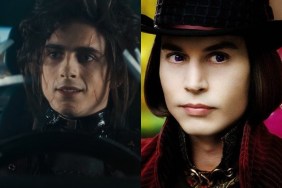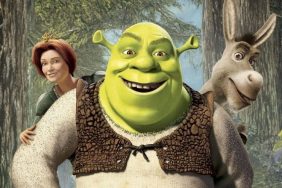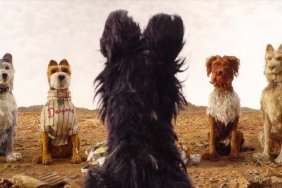Flying ace, secret agent and children’s storyteller Roald Dahl has a very special place in our collective hearts. The author of such classics as Charlie and the Chocolate Factory, Matilda and The BFG (to name only a few) has connected with kids from multiple generations, and his darker stories for adults continue to resonate as well.
Also: ‘The BFG’ Review | We Are The Dreamers Of Dreams
But although Roald Dahl’s works have been adapted to the screen many times over the years, picking the very best can be a tricky proposition. That’s why we asked our experts – Crave’s William Bibbiani and Witney Seibold, and Collider’s Brian Formo – to consider all the options and each pick one, and just one, Roald Dahl adaptation to stand out as the very best.
This time, two of our contributors managed to agree on a single animated comedy, while the outlier opted in favor of a tried-and-true family classic. Find out who picked which Roald Dahl movie, and why, and come back next week for an all-new, highly debatable installment of The Best Movie Ever!
William Bibbiani’s Pick: Willy Wonka & the Chocolate Factory (1971)

Paramount Pictures
Roald Dahl rather famously disliked Mel Stuart’s adaptation of Charlie and the Chocolate Factory (which was renamed, because the Vietnam War introduced a rather unfortunate new connotation for the word “Charlie”). I still worship at Roald Dahl’s feet, but even so, have to disagree with him on this one. Willy Wonka & the Chocolate Factory captures the spirit of Roald Dahl in a beautiful, sometimes terrifying way. (For the record, Stephen King doesn’t like Stanley Kubrick’s version of The Shining and I disagree with that too.)
It’s the story of a boy named Charlie (Peter Ostrum), who lives a sweet life in abject poverty, dreaming of little boy dreams, like delicious sweets. When a chocolate entrepreneur named Willy Wonka (Gene Wilder) announces a contest to take a tour of his mysterious and magical factory, Charlie defies the odds and wins himself a ticket, along with a gaggle of other, mostly terrible children whose faults are revealed and punished by the sometimes affable, sometimes ghoulish candyman.
If you read Roald Dahl’s writing, you may discover that he doesn’t much care for adults and he doesn’t much care for most children either. Nasty people do nasty things throughout most of his stories. But he does delight in meting out fantastical comeuppance. He revels in the wonders of the world, but he suggests that some people are just too mean to be worthy of them. It’s a mentality that works well in the fantasy genre, where allegories like Willy Wonka transform wish-fulfillment stories into cautionary fables, often on a dime.
Willy Wonka & the Chocolate Factory lives in that ethereal space between dreams and nightmares, between genuineness and satire. It changes some aspects of the book, and mostly for the better (Charlie basically disappears for most of the novel anyway, and here he actually has something to do). And Gene Wilder gives one of the most distinctive and spritely performances in motion picture history. So yes, Dahl may not agree, but I think this is the best adaptation of his work. (Honorable mentions: The Witches and Fantastic Mr. Fox and Steven Spielberg’s The BFG.)
Witney Seibold’s Pick: Fantastic Mr. Fox (2009)

20th Century Fox
Roald Dahl, back in 1971, was so offended by Hollywood’s take on his novel Charlie and the Chocolate Factory, that he swore no studio would make a film of his work while he was still alive. He had dabbled in Hollywood screenwriting before (he You Only Live Twice and Chitty Chitty Bang Bang) and even authored some obscure-in-America British thrillers. When he died in 1990, all bets were off. Since 1990, there have been six major Hollywood Dahl adaptations, not to mention numerous shorts and British TV specials. It’s tempting to posit that Dahl would have hated all the films based on his books, as few seem to capture the tone and the spirit of his work entirely accurately. Having seen The BFG, I can say that it is perhaps the most accurate yet.
But in terms of cinema, I would have to declare the Wes Anderson’s 2009 film Fantastic Mr. Fox is perhaps the best of the Roald Dahl-based films, not because of how it treated Dahl’s work, but because of what it did for Anderson. Wes Anderson has always been the most driven of aesthetes, often placing his characters in carefully color-coded, impeccably-framed dioramas of self-constructed artistic perfection. Every single character in every Wes Anderson film exists within their own carefully assembled world of dress, art, and interior design. Just like Anderson himself, all his characters live for aesthetics.
Fantastic Mr. Fox allowed Anderson to shed the shabbiness of his earlier films by replacing his actors with fuzzy animated animals figures. He could now make his frame as spare and as symmetrical as he wanted, and the film feels whole and pure and 100% Anderson for the first time. Sure, the film possesses none of Dahl’s particular brand of British wryness, but it’s replaced by Anderson’s hipster American wryness, which allows the film to function on a different level. One wouldn’t think Dahl and Anderson would marry well, but Fantastic Mr. Fox allowed both artists to coexist.
Brian Formo’s Pick: Fantastic Mr. Fox (2009)

20th Century Fox
First things first, I’ve never actually read Roald Dahl nor had Dahl read to me. So my choice is less the film that best represents his prose and more about the film I think became the best movie from a story he’d written. Even without reading Dahl, through the films based on his work, I am aware that he has a unique voice within the wide world of children’s books. His stories put the imagination and fears of the children first. The emphasis is not on their antagonist.
I don’t know if kids like Wes Anderson’s Fantastic Mr. Fox, but in viewing movies like James and the Giant Peach, The Witches, Charlie and the Chocolate Factory and Matilda, it’s certainly would make sense that Wes Anderson would have loved reading Dahl as a kid. Throughout Anderson’s filmography there is an emphasis on the books that his young characters read to build their imagination of a world other than their own. Anderson also includes adventure-filled books that his adults recall from their youth, which they strive to rekindle in their adulthood. In both Dahl’s adaptations and Anderson’s films there is a certain type of private schooling that informs the children that the world is a big place, that there are big things to pursue and that the history of the adventurous spirit is all around them.
Anderson applied his family dynamics of a play-by-his-own-rules patriarch—and his offspring who only wants to impress his father but cannot seem to do so—to Dahl’s fox family. The animation is beautifully autumnal. The score is rollicking. The local farmers who are trying to rid their land of the Fox clan are corporately evil. But it’s the young fox who becomes jealous of his confident cousin by how quickly he’s able to win his father’s affection—by being good at sports and emotionally stable—that hits Dahl’s childhood fear on the nose: feeling like you need to impress your pops in order to keep his love is a scary proposition.
Previously on The Best Movie Ever:
Top Photos: Paramount Pictures / 20th Century Fox
The Best Movie Ever
-
The Best Movie Ever | Under the Sea

Is the best movie ever set underwater a family film about a fish or a World War II movie about a German submarine?
Photos: Disney / Pixar / Neue Constantin Film
-
The Best Movie Ever | Video Game Adaptations

There aren't a lot of good video game adaptations, and our critics just can't agree on which one is the best.
Photos: Universal Pictures / New Line Cinema / Dimension Films
-
The Best Movie Ever | Reptiles

Movies about slithery things aren't very common, so our critics are presenting their picks for the best reptile movies ever.
Photo: Warner Bros. / Paramount Pictures / New Line Cinema
-
The Best Movie Ever | Helena Bonham Carter

Is Helena Bonham Carter's best movie a classy costume drama or a twisted critique of contemporary masculinity?
Photo: Fine Line Features / Miramax Films / 20th Century Fox
-
The Best Movie Ever | Crime Comedies

What's the best comedy ever made about living a life of crime? Our critics present their picks.
Photo: MGM / Warner Bros. / Janus Films
-
The Best Movie Ever | Jodie Foster

The Oscar-winning actor/director is one of the most respected artists in the film industry. But what's her best movie ever?
Photo: Columbia Pictures / Warner Bros. / MGM Home Entertainment
-
The Best Movie Ever | Robert Downey Jr.

The man who would be Iron Man has had one of the most unusual careers in film history, but which movie is his best?
Photo: Warner Bros. Pictures / Paramount Pictures
-
The Best Movie Ever | Cats

Keanu may be a great comedy about a cat, but what's the best cat movie ever? Our critics picked some WEIRD films this week!
Photo: Drafthouse Films / United Artists / Kindai Eiga Kyokai
-
The Best Movie Ever | Charlize Theron

Is Charlize Theron's best movie the one that earned her an Oscar, or the one that kicked ass?
Photo: Warner Bros. / Newmarket Films
-
The Best Movie Ever | Ice Cube

It's been 25 years since Ice Cube made his acting debut. So what's his best movie ever?
Photo: Miramax Films / New Line Cinema / Universal Pictures
-
The Best Movie Ever | Dreams

What's the best movie ever made about dreams, dreaming or dreaminess? Our critics present their picks.
Photo: Films du Losange / Criterion / Fox Searchlight
-
The Best Movie Ever | Batman

Everybody loves Batman, but what's the best Batman movie ever? Our critics can't agree in this week's roundup.
Photo: 20th Century Fox / Warner Bros.
-
The Best Movie Ever | Superman

Batman v Superman isn't the best Superman movie ever, so we asked our stable of critics to decide which one is.
Photo: Warner Bros.
-
The Best Movie Ever | Justice

Let's celebrate this exciting new Dawn of Justice with a spirited debate about the best movie ever made about justice itself.
Photo: Koch-Lorber / 20th Century Fox / United Artists
-
The Best Movie Ever | John Goodman

The star of 10 Cloverfield Lane has had an astounding career, but what's his best movie ever?
Photo: Gramercy Pictures / 20th Century Fox
-
The Best Movie Ever | Die Hard Ripoffs

Die Hard spawned a whole genre of action movies that live on to this day, but which Die Hard ripoff is the best?
Photo: 20th Century Fox / Columbia Pictures / Golden Princess Film Production
-
The Best Movie Ever | Oscar Bait

'Oscar bait' isn't an insult, it's a genre. So what's the best Oscar bait movie ever?
Photo: The Weinstein Company / Universal Pictures
-
The Best Movie Ever | Witchcraft

What's the most bewitching movie ever made about witches? Our panel of critics narrows it down to two classic films.
Photo: Criterion / American International
-
The Best Movie Ever | Action Comedies

If Deadpool isn't the best action comedy ever, what is? Our panel of film critics make the case for their favorites.
Top Photo: Warner Bros. / RM Films International / 20th Century Fox
-
The Best Movie Ever | George Clooney

Everyone loves George Clooney, but none of our critics can agree on which film qualifies as his very best.
Photo: Buena Vista / Universal / Warner Bros.
-
The Best Movie Ever | Martial Arts

Our panel of critics fights over their picks for the best martial arts movie ever made. There can be only one!
Top Photo: Shaw Bros. / Warner Bros. / Toho
-
The Best Movie Ever | Creepy Dolls

Everyone's frightened of little toy people, but what's the creepiest creepy doll movie ever?
Top Photo: Universal Pictures / United Artists / New World Pictures
-
The Best Movie Ever | Modern Warfare

If 13 Hours isn't the best movie about our contemporary wars, what is? Our panel of critics weighs in.
Photo: Warner Bros./Columbia Pictures/Summit Entertainment
-
The Best Movie Ever | Revenge

If The Revenant isn't the greatest revenge movie, what is? Our film critics nominate some of the best films ever made.
Top Photos: Janus Films / Paramount Pictures / Tartan Films
-
The Best Movie Ever | Parties

We asked our critics to pick the best party movie ever made, and none of them picked a film about a frat house.
Photo: Warner Bros. / 20th Century Fox / Sony Pictures Classics
-
The Best Movie Ever | Quentin Tarantino

Is the Hateful Eight director's best film an autumnal romance or a World War II drama? Our critics can't decide.
Photos: The Weinstein Company / Miramax
-
The Best Movie Ever | Star Wars

Is A New Hope better than The Empire Strikes Back? Our critics debate the classics (and ignore the rest).
Photos: Disney / LucasFilm
-
The Best Movie Ever | Ron Howard

He's directed films in nearly every genre and won an Oscar for his troubles, but what's the best Ron Howard movie ever?
Photo: Touchstone / Universal / MGM
-
The Best Movie Ever | William Shakespeare

He's the most adapted author in movie history, but which William Shakespeare movie is the very best?
Photo: Top Photos: Toho / Paramount / Columbia
-
The Best Movie Ever | Pixar

Everyone has their favorite Pixar movie, but which one is the best?
Photo: Disney
-
The Best Movie Ever | Young Adult

Before you say goodbye to The Hunger Games, find out what our critics think was the best young adult movie ever.
Photo: Universal Pictures / Warner Bros.
-
The Best Movie Ever | Angelina Jolie

She's been acting for decades, directing for years, and winning our admiration forever. But what is Angelina Jolie's best film ever?
Photo: The Samuel Goldwyn Company / HBO / Columbia Pictures
-
The Best Movie Ever | James Bond

It's new school versus old school! Our critics debate which film qualifies as the best Bond movie ever.
Photo: MGM / Colombia Pictures / United Artists
-
The Best Movie Ever | Sandra Bullock

Our critics can only agree on one thing: the best Sandra Bullock movie isn't the one that got her an Oscar.
Photo: 20th Century Fox / Warner Bros.








